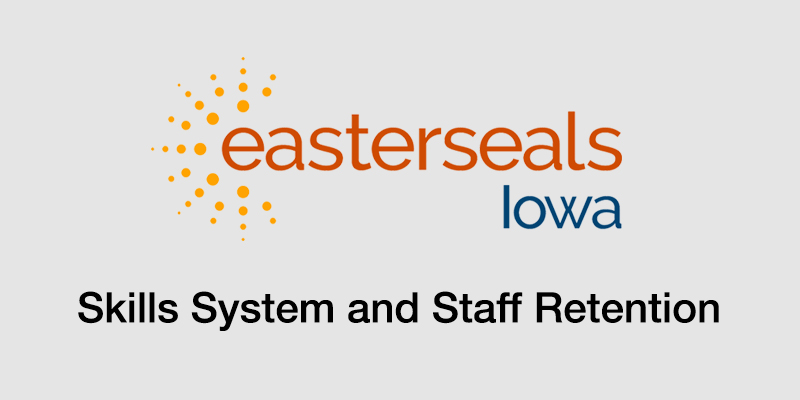Zachary Harper, the Director, Training and Development of Easterseals, Iowa, shared the following staff retention data and a description of his organizations journey.
Staff retention data from Easterseals, Iowa:
2-year general staff retention rate: 53%
2-Year retention rate for staff who complete the Skills System E-Learning: 91%
2-year retention rate for staff who complete these three trainings: 100%
- Skills system E-Learning
- Motivational Interviewing (in-hour 6-hour in person training)
- De-escalation Training (CPI)
Insights from Zachary Harper:
Like any other provider in the field, Easterseals Iowa has been working through the workforce shortage by trying to find any opportunities to better prepare and develop new team members for the difficult work we do. We cannot change the pay our team members receive due to reimbursement rates stagnating, while simultaneously working with more and more complex needs on a daily basis. As someone who joined Easterseals nearly 15 years ago with no human services background or degree and recognized that this field can no longer pay for a student loan from a four year university, we needed to look at what knowledge and skills we assumed new team members would have and how to fill that skill gap.
Starting in 2021, with the opening of our Brain Health Department bringing new access to internal training expertise, we began to focus in on consistently offering two main pillars to DSPs throughout the agency – Motivational Interviewing and De-escalation. In April 2022 we began implementation of the Skills System by targeting a few specific departments to push soft rollouts while still opening it up to any interested DSPs within the agency. Crisis Stabilization built Skills System into its development, requiring it for team members, while Hourly Supported Community Living became a focused department that was not required but quickly
As of April 2024, the impact of Skills System had completely changed the trajectory of our training strategy – seeing the impact on clients had turned it from an addition to the central pillar of training. Both a closed and open Skills group was run within our Brain Health Department. We had created a position called Skills System Field Coach, allowing us to have an internal expert on implementation. A monthly practice began to be held at our Day Habilitation program. Multiple 24 Hour Supported Community Living homes began providing the training to the clients. This led to the question of whether to begin requiring the training for all team members as opposed to the opt-in strategy we had started with, and so this data was gathered to see the effect the training had on retention.
This data was specifically for Direct Support Professionals – all leadership/management was removed as tenure for our management is generally longer than DSPs. We looked at the data from two points – those who were already employed when we began the rollout, and those who were hired after the rollout, knowing that many who took the training who were already hired as of April 2022 would be employees who were identified as high performers and so may be more likely to be retained. The surprising part of the data, however, was that the comparative retention rate was just as strong for employees hired after April 2022 as it was for those already employed – many of these were team members new to the field with little to no past training or experience as is common for new hires in HCBS post-covid.
Additionally, this supported a core belief we had been developing that De-escalation, while certainly useful, was not the most-effective training as it is a reactive training, focusing on when a behavioral communication is already reaching a stressful point. Motivational Interviewing and Skills System instead focus on how to prevent the need for those stressful moments and both are more effective at preparing team members for day to day interactions in this field.

